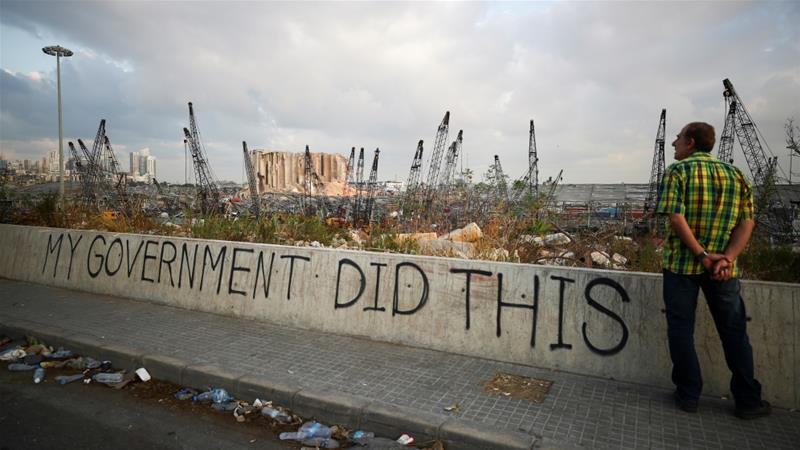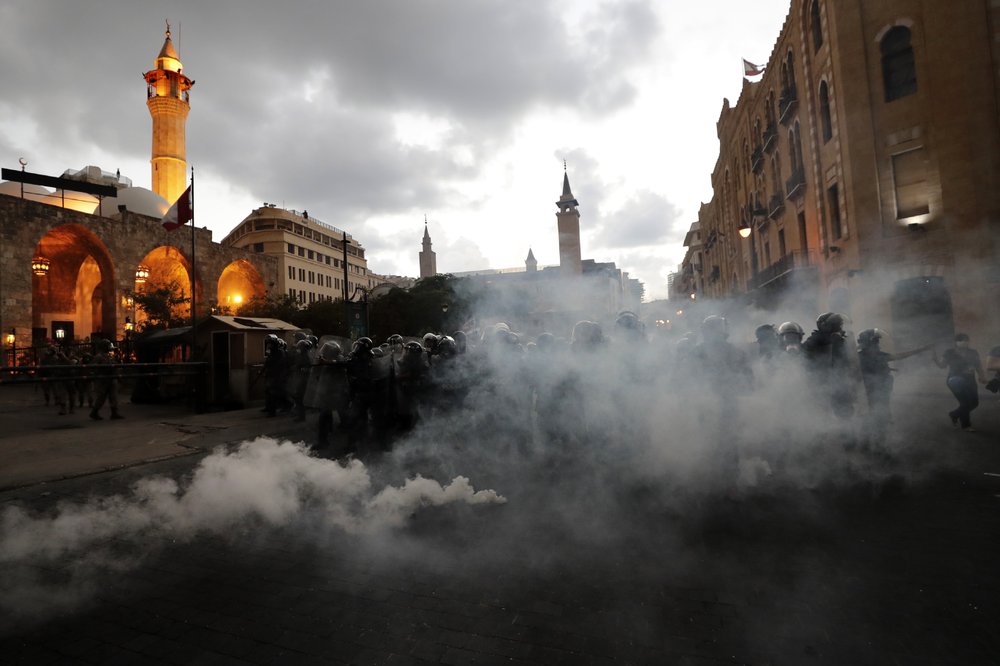
A man stands next to graffiti that reads "My government did this" at the damaged port area in Beirut, Lebanon August 11, 2020. /Reuters
A man stands next to graffiti that reads "My government did this" at the damaged port area in Beirut, Lebanon August 11, 2020. /Reuters
Lebanon's judicial investigation of the Beirut port explosion started with political wrangling over the naming of a lead investigator, military threats and doubts over whether a panel appointed along sectarian lines could be fully impartial.
Thursday, a U.S. envoy said the Federal Bureau of Investigation of the U.S. (FBI) is ready to step into the probe, urging for changes in Lebanon to "make sure something like this never happens again."
"The FBI will soon join Lebanese and international investigators at the invitation of the Lebanese to help answer questions about the circumstances that led up to this explosion," U.S. Undersecretary for Political Affairs David Hale said on Thursday.
The explosion at Beirut port killed 178, injured 6,000 people and forced around 300,000 out of their homes in the city, which was already sinking deep into the financial crisis. Some 30-40 people remain missing.
Many have cast doubt on the ability of the country's weak judicial authorities to carry out a full and transparent investigation into the blast. But Lebanon's caretaker Justice Minister Marie-Claude Najem says it is a "chance" for this vital institution to earn public trust by holding those responsible accountable.
Lebanon's powerful Hezbollah, which is a designated terrorist organization by the U.S. and EU, said the army should lead such a probe because it was "trusted" by all. But itself is facing an allegation of storing arms at the port.
So far, there is no investigator had yet been selected.
Najem also said that there are already international experts involved in the investigation, such as the French public prosecution, which is due to the existence of French casualties.
French Ambassador Bruno Foucher, in a tweet, claimed that the French involvement "a guarantee of impartiality in the investigations and of speed".
Lebanese President Michel Aoun has said the investigation would look into whether the cause was negligence, an accident, or possibly "external interference," which is the first public official raised the possibility that the port had been attacked by international forces.
Aoun has asked France for satellite imagery for the probe. A UK Royal Navy vessel was also deployed to Beirut to survey the site.
President Anoun once publicly rejected any international probe into the blast before, as he saw it as an attempt to "dilute the truth."

The police push back anti-government protesters during demonstrations following the massive explosion which devastated Beirut, Lebanon, August 10, 2020. /AP
The police push back anti-government protesters during demonstrations following the massive explosion which devastated Beirut, Lebanon, August 10, 2020. /AP
So far, the probe has led to 21 arrests, including the port's general manager Hassan Koraytem, other customs officials and port engineers, a judicial source told AFP.
Dozens more were being interrogated by Lebanon's military court, which is focusing on administrative and security officials at the port as well as government authorities who may have ignored warnings about explosive materials.
"The list of arrests will reach the top guys, who are now among the suspects," the source said.
Lebanon's central bank also ordered asset freezes for seven port and customs officials, an official and a banking source told AFP.
Military gets sweeping new powers
The government resigned on Monday, left the Cabinet in a caretaker capacity.
Before it resigned, the government declared a state of emergency that gave the military the power to declare curfews, prevent public gatherings, and censor the media, as well as refer civilians to military tribunals for alleged security breaches. The action required approval by lawmakers, which they granted Thursday.
The move has been criticized by rights groups and others who say the civilian government already was operating with increased powers because of the coronavirus outbreak. Some pointed to the military crackdown on protesters last week, fearing the extended powers could lead to silencing dissent.
"There is incredible chaos," Nizar Saghieh, Lebanon's human rights lawyer, said. He said the state of emergency's only justification is to extend the power of the state and security agencies and "control the opposition."
"We were waiting for the army to help in reconstruction, not be an extension of power," he said.
(With input from agencies)